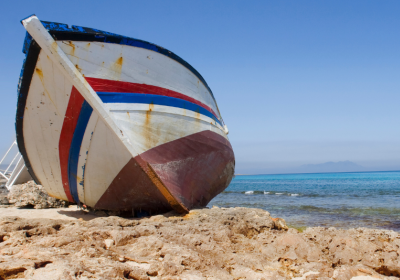The latest migrant drownings off the Tunisian coast have led to further scrutiny of Tunisia’s treatment of migrants from sub-Saharan Africa, reports Peoples Dispatch.
Tunisia
Gilbert Achcar, a socialist writer who has long followed the Arab world, says the current Tunisian revolt, with protests against spending cuts and austerity breaking out across the country this month, was a “foreseeable” continuation of the Arab Spring uprisings of 2011.
Archar spoke to Calian Mace and Hala Kodmani in a January 14 interview first published in French daily Liberation. The version below is reprinted from International Viewpoint.
***
 Flag of PKK with image of Abdullah Ocalan.
Millions of Kurds view Abdullah Öcalan as their political representative. His freedom is directly linked to a democratic and peaceful solution to the war in Turkey.
Flag of PKK with image of Abdullah Ocalan.
Millions of Kurds view Abdullah Öcalan as their political representative. His freedom is directly linked to a democratic and peaceful solution to the war in Turkey.
In the more than four years since mass uprisings ousted dictatorial regimes in Tunisia and Egypt, it can seem that the initial hopes represented by these mass movements lie in tatters.
Libya, Syria, Yemen and Iraq remain mired in bloody armed conflicts that have led to the deaths of hundreds of thousands and displaced millions more within and across borders.
In the pivotal case of Egypt, military rule has returned through the violent crushing of protests, the arrests of an estimated 40,000 people and the rebuilding of the repressive structures of the Hosni Mubarak era.
More than 4000 local and global groups from 120 countries took part in the 14th World Social Forum in Tunisia from March 24 to 28. The WSF was created as a popular alternative to the corporate-dominated, elite World Economic Forum (WEF) in Davos.
The first WSF was held in Brazil in 2001 and was organised as an alternative to the WEF, the yearly meeting of the global ultra-rich.
Tunisians are now enjoying the pleasure of thinking up the most improbable “scenarios” of political alliances between political Islamists, militant secularists and left wingers. Why? The Tunisian parliamentary elections of October 26 did not produce a majority party and rumours are everywhere.
For the left, the results have posed serious problems.
In a move aimed at demobilising and splitting the opposition, the leaders of Tunisia's governing party, Ennahda, reached out to Beji Caid Essebsi, leader of the secular ex-regime party Nidaa Tounes. It was part of a bid to resolve the political crisis that has crippled the north African nation for weeks.
Daily protests are demanding the dissolution of Tunisia's National Constituent Assembly (NCA) in the wake the assassination of Popular Front leader Mohamed Brahmi.
In the face of the protests, leader of the Ettakatol party and speaker of the NCA Mustafa Ben Jafaar announced the suspension of the body on August 6.
However, the main party of government, Islamist group Ennahda, has refused to concede the dissolution of the NCA, in which it holds the largest number of seats. Ennahda now looks to have negotiated the NCA's resumption.
For the second time in six months, Tunisia's government has been thrown into chaos after the killing of a left-wing leader. Mohamed Brahmi, a leader of Tunisia's Popular Front, was assassinated on July 25.
Brahmi was attacked by two men on motorbike outside his home in Ariana, a suburb of Tunis, and was shot 11 times. He was taken to Mahmoud Matri Hospital, where he was pronounced dead on arrival.
His widow M'barka told radio station Mosaique FM: “He died as a martyr to his opinion and position”, Tunisia Live said. She added that “he was killed by a terrorist gang”.
The assassination of left-wing leader Chokri Belaid has thrown the interim government of Tunisia, led by Islamist party Ennahda (the Renaissance), into a deep crisis. Prime Minister Hamadi Jebali has threatened to resign if his proposed "technocratic" solution can't be implemented.
The death of Belaid, a well-respected leader of the united left group Popular Front, led to widespread protests, including tens of thousands on the streets of Tunis for his memorial on February 8.
Furious protests have exploded onto Tunisia's streets and a general strike has been called after the assassination of left-wing politician and lawyer Chokri Belaid on February 6.
Belaid was head of the far-left Party of Democratic Patriots (PPD). His killing is Tunisia's first reported political assassination since independence.
Protesters have taken to Tunisia's streets to insist the transitional government of Hamad Jebali fulfill the demands of the January 14 revolution that overthrew dictator Zine el-Abidine Ben Ali.
The regional city of Siliana, located 130 kilometres south-west of the capital Tunis, was rocked by days of protests over the lack of investment and jobs in the region.
- Page 1
- Next page








